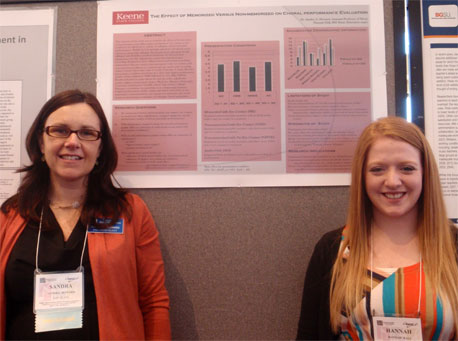
During the 2012–2013 academic year, Assistant Professor of Music Sandra Howard and Hannah Hall, a junior studying music education, conducted a quantitative experimental research study entitled “The Effect of Memorized Versus Non-memorized on Choral Performance Evaluation.” The project investigated the way judges rated the quality of choral performances with different combinations of nonmusical factors (i.e., memorized music versus nonmemorized and eye contact versus no eye contact with the choral director).
The researchers video recorded the Keene State Chamber Singers performing an a capella song, “The Blue Bird” by Charles Villiers Stanford. In one recording, the Singers memorized the music and did not hold the score in a music folder. In a second video, the Singers hadn’t memorized the music, held music folders, and made eye contact with the choral director. In a third video, the Singers read the music from the folders and didn’t make eye contact with the director. The fourth video was audio only, so judges didn’t see the Singers performing. The researchers took the audio from the memorized version and dubbed it over all four versions so that the sound of the performance did not vary.
They then sent an online survey with the videos to middle- and high-school music teachers along with selected music professors from several NASM-accredited institutions across the country and asked them to score the videos on a scale of 1 (weak performance quality) to 6 (strong performance quality). What they learned surprised them. “We had thought that the video that was memorized would receive the highest scores, because it is common practice to memorize music in the choral world,” Hannah explained. “However, we were surprised to find that the performance in which the Singers read from the score but made eye contact with the director received the highest score.” Judges found that, even with the presence of the music folders, the Singers were able to communicate the message of the music more effectively than when they performed it memorized.
The study was accepted for poster presentation at the 2013 National Association for Music Education Eastern Division Conference in Hartford, Connecticut in April. The Performing Arts Student Travel Fund, offered by KSC’s School of Arts & Hunanities, supported the costs associated with the presentation and Hannah’s conference travel. Not only were the researchers surprised at the results, so were the conference attendees. “Often directors will spend so much time asking their students to memorize the music, rather than focusing on the sound of the music,” Hannah said. “This information will become very useful to me when I am directing a choir someday. I now know that you should always do what works best for the choir.”

Thank you to our generous donors for making student travel possible! These sorts of experiences are life changing for our students.
Congratulations, Sandra and Hannah on a very exciting project!